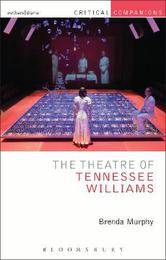
|
The Theatre of Tennessee Williams
Hardback
Main Details
Description
This book is open access and available on www.bloomsburycollections.com. It is funded by Knowledge Unlatched. Perfect for students of English Literature, Theatre Studies and American Studies at college and university, The Theatre of Tennessee Williams provides a lucid and stimulating analysis of Willams' dramatic work by one of America's leading scholars. With the centennial of his birth celebrated amid a flurry of conferences devoted to his work in 2011, and his plays a central part of any literature and drama curriculum and uibiquitous in theatre repertoires, he remains a giant of twentieth century literature and drama. In Brenda Murphy's major study of his work she examines his life and career and provides an analysis of more than a score of his key plays, including in-depth studies of major works such as A Streetcar Named Desire, The Glass Menagerie, Cat on a Hot Tin Roof and others. She traces the artist figure who features in many of Williams' plays to broaden the discussion beyond the normal reference points. As with other volumes in Methuen Drama's Critical Companions series, this book features too essays by Bruce McConachie, John S. Bak, Felicia Hardison Londre and Annette Saddik, offering perspectives on different aspects of Williams' work that will assist students in their own critical thinking.
Author Biography
Brenda Murphy is the Board of Trustees Distinguished Professor of English at the University of Connecticut, USA. Besides her many books and articles on American theatre, she is the editor of the Student Edition of After the Fall by Arthur Miller (Bloomsbury Methuen Drama, 2011).
Reviews[Murphy] brings together ... useful information from Williams' work, writings and correspondence to make this a valuable academic work for anyone studying the playwright or American theatre ... A useful and well-written work -- David Chadderton * British Theatre Guide * Brenda Murphy's The Theatre of Tennessee Williams is a thoroughly enjoyable read. The book describes the genesis and major themes of all of Williams's best-known plays and many of those that are less familiar; it provides, as well, an illuminating account of the plays' first productions and the ways in which they were inflected by their cultural contexts. Murphy writes with lucidity and an eye for the engaging detail, the telling quotation that will appeal to a broad audience. Her book serves as both a useful guide to Williams's work and an important contribution to the ongoing re-evaluation of that work -- Verna A. Foster, Loyola University * Modern Drama *
|